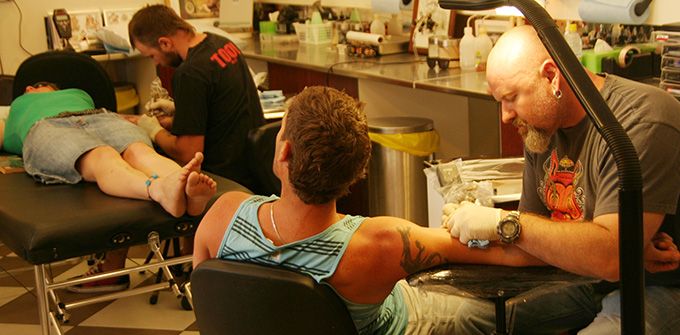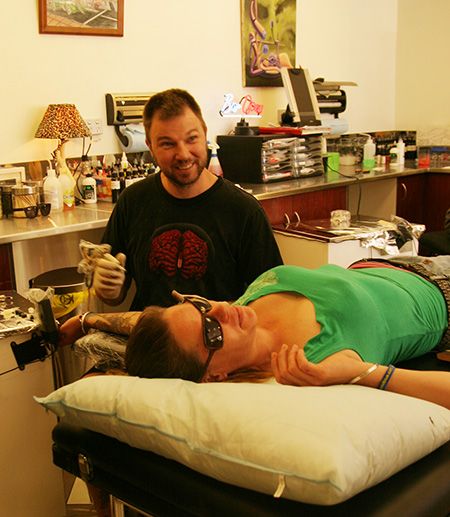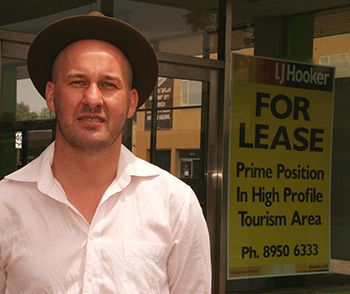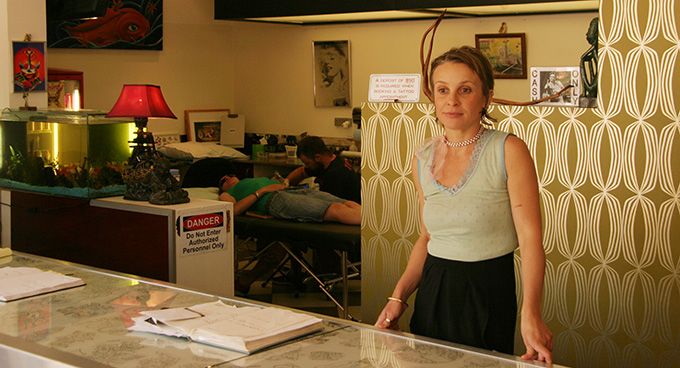DIY Alice: building on the strengths of young enterprise and consumers
1 December 2011

There’s a movement around Australia to arrest urban decline. Alice could follow the example of some other fight backs.
By KIERAN FINNANE
They’re bucking a trend: as businesses close down or leave the town centre for another location, they’ve moved into Gregory Terrace, just around the corner from Todd Mall’s busy southern end. They’ve done a clever and stylish revamp of the former fish ‘n’ chips shop – the old bain-marie is now a display counter, the exhaust hood has become a lightbox. They’re catering to younger consumers – 18 to 35 years – and doing what it takes to appeal to them: offering an experience, not just a product; a cool aesthetic, mixing retro elements with a clean contemporary finish; working flexible hours that suit their customers.
Dwayne Chapple and partner Peta Coburn bought the tattooing business, formerly at the Polana Centre on Smith Street, after Mr Chapple had been working in it for three years.
“We wanted to get away from the stigma of the old shop, the old tattoo cliches. We wanted to be part of the community, be where the action is,” says Mr Chapple.
“So we moved, changed the name, remodelled and rebadged the business to attract a new crowd. We wanted to make it as open and friendly as possible and give tattooing back to artists. We consider ourselves as artists.”
 They’re paying a bit more rent, but it has definitely been worth it, he says: “We’re in a good spot, we’ve got more space and we’ve been able to set up the shop the way we want it.”
They’re paying a bit more rent, but it has definitely been worth it, he says: “We’re in a good spot, we’ve got more space and we’ve been able to set up the shop the way we want it.”
“Clean, slick, inviting, visually interesting” is the look they were after, says Ms Coburn: “The transparency is really important, people can look in and see the boys working as artists.”
They open at around midday and work till about 7.30pm; on Saturdays they work till late afternoon, catering for people who do the standard working week.
Stay True Tattooing is a good example of a business recognising the strength of the local younger market, says Matty Day. A former professional skateboarder turned community development activist, he recently joined the business innovation committee started by Alderman Murray Stewart in an attempt to get some creative focus on Alice’s declining economic fortunes.
Mr Day is convinced that there is opportunity in the current situation. It’s not the time to try to revamp old scenarios with gimmicks and one-off events; nor is it time to put out our hand in a ‘poor bugger me, Darwin gets it all’ frame of mind. Instead, let’s have some ‘do it yourself’ development, he urges, that builds on our internal strengths and deals head-on with our weaknesses. Let’s think about rebuilding in our own community instead of creating ‘product’ for tourists. A happier, safer, vibrant town – especially in its public spaces – is the necessary underpinning for a healthy tourism industry in any case.
He is taking his cues from the Renew movement, which began in Newcastle in late 2008, driven by a prominent arts and media identity, Marcus Westbury. Melbourne-based, Mr Westbury had grown up in Newcastle. He found his home city in decline: in the two main streets 150 buildings were empty. The area was widely seen as violent and dangerous; there was a lot of vandalism, graffiti, and growing anger and distrust in the community.
His answer was to establish Renew Newcastle as a not-for-profit company. It took on a brokering role between property owners and new enterprises, proposing that empty buildings be licensed to his company on a rolling 30 day basis. The license offered legal protection all around and the 30 day period meant owners wouldn’t have to forgo a commercial opportunity if one arose.
The empty premises were then used to grow viable enterprises, both for profit and not-for-profit, and to bring “life, interest and community activity back to the city centre”.
Within 18 months the Hunter Street Mall went from 20 empty shops to three. Some were filled by Renew Newcastle projects, but “a lot”, according to Mr Westbury, were commercial ventures. City-wide 55 new community groups, creative projects and social enterprises were established.
The ideas started to catch on: there are now similar revitalisation schemes in Adelaide, Townsville, Geelong and Parramatta. Mr Day says Alice could be next.
 The empty shops and vacant sites in the town centre should be treated as an opportunity. The night markets demonstrate some of the local potential: some of the stall holders would be ready to go into a shop in this kind of scheme. New business could be drawn out of the woodwork. He mentions natural therapies as one possibility; food businesses are another, in particular tapping into the food cultures of our growing African and Asian populations.
The empty shops and vacant sites in the town centre should be treated as an opportunity. The night markets demonstrate some of the local potential: some of the stall holders would be ready to go into a shop in this kind of scheme. New business could be drawn out of the woodwork. He mentions natural therapies as one possibility; food businesses are another, in particular tapping into the food cultures of our growing African and Asian populations.
Arts and crafts businesses could draw on the strengths of the networks around existing organisations like Watch This Space and Central Craft. Arts and crafts ventures provided much of the impetus for Renew Newcastle.
There’s also an opportunity begging with the closure of the local Vinnies: there’s now a huge surplus of recycled clothing in town.
“All you need is a young person with an eye for picking out the cool stuff, a venue and there’s a great business,” says Mr Day. “Retro or vintage clothing is huge interstate. Given a chance to get going, this could become a viable permanent business, able to pay full commercial rent.”
Existing businesses could also help themselves if they paid more attention to younger consumers, argues Mr Day. If they don’t it will be at their peril, for this is the age bracket more likely to shop online. To compete with cheap product that can be sourced over the internet, businesses have to offer an experience: it’s about service, relationships, aesthetics. They need to have customer-friendly hours, recognising the time constraints on their customers, from things like school, sport, work; make the seasonal adjustments, opening into the evening in summer.
The Town Council could do their bit too: it’s time to question their bans on bike-riding, skating, skate boarding in the mall, all things associated with young people. Attractive, active public spaces will bring economic benefits and passive security, the two being inter-connected, argues Mr Day – a point repeatedly made during the urban design consultations that we spent all that time and money on over the last three years.
“Let’s get over the old divisive labels of ‘southern do-gooders’ and ‘east-coast experts’. They just deprive of us of a lot of good ideas. And it’s useful to recognise that our situation is not unique. Urban decline happens in other places and people sometimes get on top of it.
“We have the talent here in town to do our own development. Once we start to demonstrate the benefits, the town’s self-esteem will be lifted, there’ll be more growth and prosperity, Alice Springs can start a new story.”
Pictured: From top – Tattoo artists Craig Saunders (front) and Dwayne Chapple at work. • Dwayne Chapple: “We wanted to be part of the community, be where the action is.” • Matty Day in front of a vacant former tourism business on the corner of Gregory Terrace and Todd Street: Time for some new ideas? How about rebuilding in our own community instead of trying to create ‘product’ for tourists. The tourists are likely to follow if the community is happier, safer, more vibrant. • Peta Coburn: They’ve created a “clean, slick, inviting, visually interesting” look for their business, getting away from the old tattooing cliches.



